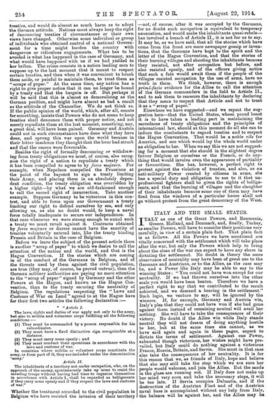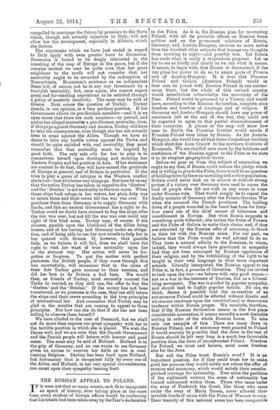ITALY AND THE SMALL STATES.
ITALY as one of the Great Powers, and Roumania, Greece, Holland, and Denmark, and, finally, Turkey, as smaller Powers, will have to consider their positions very carefully, in view of a certain plain fact. That plain fact is as follows. All the Powers we have mentioned are vitally concerned with the settlement which will take place after the war, but only the Powers which help to bring about the close of the war can expect to have any share in dictating the settlement. No doubt in theory the mere observance of neutrality may have been of great use to the Germans and Austrians, or to the Allies, as the case may be, and a Power like Italy may be able to say to the winning States : " You could not have won except for our neutrality. If we had thrown ourselves into the other scale you would have been beaten. Therefore we have a, perfect right to say that we contributed to the result achieved, and we demand a bearing in the settlement." Such logic, we venture to say, will be ignored by the winners. If, for example, Germany and Austria win, Italy's plea that they could not have won if she had gone against them instead of remaining neutral will avail her nothing. She will have to take the consequences of their victory. No doubt if the Allies win while Italy stands neutral they will not dream of doing anything hostile to her, but at the same time she cannot, as we have said again and again in these pages, expect to dictate the terms of settlement. Against one Power, exhausted though victorious, her wishes might have pre- vailed, but Italy could do nothing against a victorious France, Russia, Britain, and Servia. She must in that case also take the consequences of her neutrality. It is for this reason that we, as friends of Italy, hope and believe that she may still take the step which we are sure her people would welcome, and join the Allies. But the sands in the glass are running out. If Italy does not make up her mind very soon and take the necessary steps, it will be too late. If Servia occupies Dalmatia, and if the destruction of the Austrian Fleet and of the Austrian naval base is accomplished without any help from Italy, the balance will be against her, and the Allies may be compelled to mortgage the future by promises to the Slays which, though not actually injurious to Italy, will not allow her the development, especially in Albania, which she desires.
The arguments which we have just stated in regard to Italy apply with even greater force to Roumania,. Roumania is bound to be deeply interested in the remaking of the map of Europe at the peace, but if she remains neutral we may be quite sure that her great neighbour to the north will not consider that her neutrality ought to be rewarded by the redemption of Transylvania. Roumania's existence as an independent State will, of course, not be in any way threatened by a bond-fide neutrality, but, once again, she cannot expect great and far-reaching aspirations to be satisfied through a policy of masterly inactivity. The same may be said of Greece. Next comes the question of Turkey. Turkey stands, in our opinion, in a very perilous position. If her Government allows its pro-German members—and it is an open secret that there are such members—to prevail, and makes her alleged neutrality a pro-German neutrality, then, if things go against Germany and Austria, Turkey will have to take the consequences, even though she has not actually been in arms against the Allies. Though we have no desire to take any hostile action against the Turks, and should be quite satisfied with real neutrality, they must remember that that neutrality must be inspired by good faith. The only safe role for her to play is to concentrate herself upon developing and securing her Eastern Empire and her position in Asia. If her statesmen are content to do that, they will have earned the gratitude of Europe in general, and of Britain in particular. If she tries to play a game of intrigue in the Western conflict she is lost—lost whichever way things go. But here let us say that the action Turkey has taken in regard to the Goeben and the Breslau' is not neutrality in the true sense. When those ships took refuge in her waters, her plain duty was to intern them and their crews till the war was over. To purchase them from Germany is to supply Germany with funds, and this no neutral Government has a right to do. Turkey could no doubt have claimed to buy the ships after the war was over, but not till the war was over could any right of this kind arise. Turkey may, of course, if she chooses, gamble upon the likelihood of the Allies being beaten, and of her having laid Germany under an obliga- tion, and of being able to use her new vessels to help her in her quarrel with Greece. If, however, that gamble fails, as we believe it will fail, then we shall have the right to visit her want of true neutrality upon her in the sternest way. Her action will never be for- gotten or forgiven. To put the matter with perfect plainness, the British people, if they come through this war successfully, will remember that in the crisis of their fate Turkey gave succour to their enemies, and did her best to do Britain a bad turn. We would then, as friends of Turkey, most earnestly counsel the Turks to rescind, as they still can, the offer to buy the Goeben' and the Breslau.' If the money has not been transferred, as we presume is the case, they can still intern the ships and their crews according to the true principles of international law. And remember that Turkey may be glad in the months that are coming to appeal to those principles. But how can she do that if she has not been willing to observe them herself ?
We have alluded to the case of Denmark, but we shall not do more than express our great sympathy with her in the terrible position in which she is placed. We wish the Danes well, and we are sure that the Danish Government and the Danish people will behave with honour and good sense. The same may be said of Holland. Holland is in the grip of Germany, and no one wants to see Germany given an excuse to overrun her fields as she is over- running Belgium. Destiny has been hard upon Holland, but fortunately that is recognized fully by every one of the Allies, and Holland, in her very special circumstances, can count upon their sympathy bearing fruit.



































 Previous page
Previous page